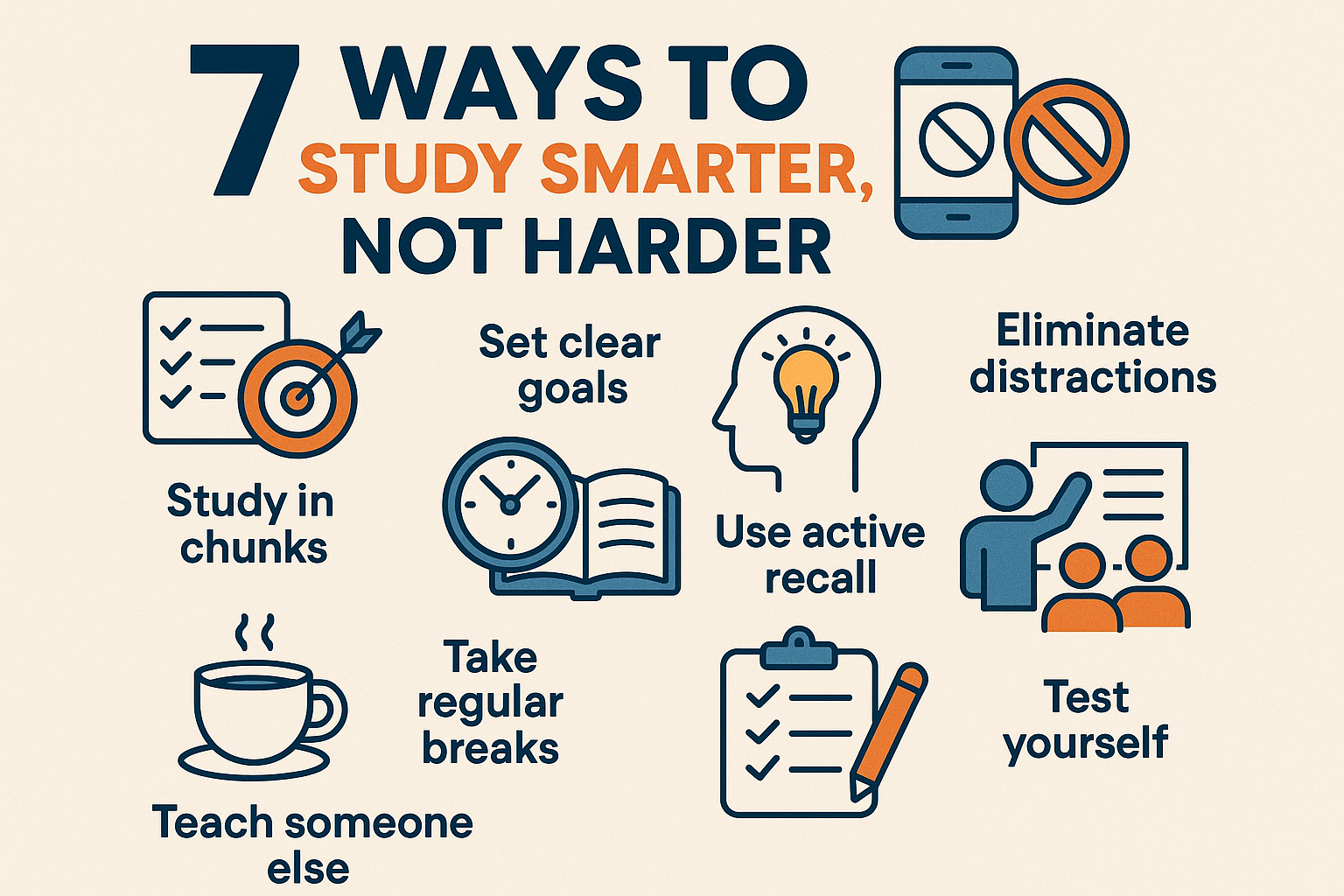
Introduction
Many students believe that studying for 8–10 hours a day guarantees success. But in reality, long hours without smart techniques can lead to burnout, stress, and poor results. The key is to study smarter, not harder. By applying proven study methods, you’ll learn faster, remember longer, and stay motivated. Here are seven powerful strategies—explained with real examples—that will help you achieve more in less time.
1. Use Active Learning Techniques
Passive reading rarely works. Active learning ensures your brain processes the information deeply.
Examples:
- After reading a history chapter, try explaining the events to a friend as if you’re teaching them.
- Instead of rereading biology definitions, create flashcards and quiz yourself.
- Solve small practice questions after studying a math concept instead of just looking at the formula.
This way, you actively interact with the material and reinforce your memory.
2. Follow the Pomodoro Technique
Studying for hours without breaks drains your brain. The Pomodoro method keeps you fresh.
How it works:
- Study for 25 minutes with complete focus.
- Take a 5-minute break (stretch, sip water, or walk).
- Repeat this cycle 4 times, then take a longer 20–30 minute break.
Example: If you’re preparing for the NEET exam, study chemistry reactions for 25 minutes, then relax for 5 minutes. When you return, switch to physics problems. This prevents boredom and fatigue.
3. Focus on Understanding, Not Memorizing
Rote learning may help in the short run but fails in exams that test application.
Examples:
- Instead of memorizing Newton’s Laws, try applying them to real-life examples like why a car jerks when brakes are applied suddenly.
- In literature, instead of cramming character traits, analyze why the character made certain choices—this makes essays easier to write.
When you understand the logic, memorization becomes automatic.
4. Use Spaced Repetition
The brain forgets fast if you study once and never review. Spaced repetition strengthens memory through intervals.
Example of a schedule:
- Day 1: Learn a new topic (say, Human Digestive System).
- Day 2: Review it briefly.
- Day 4: Go through it again with quick notes.
- Day 7: Test yourself with a short quiz.
- Day 14: Do a deeper review.
Tools like Anki or Quizlet can automate this process by reminding you when to revise.
5. Organize Your Study Space & Resources
A messy desk = a distracted mind.
Examples:
- Keep only the subject you’re currently studying on the desk. If you’re doing math, remove other books.
- Use apps like Notion, Evernote, or Google Keep to track your syllabus and mark completed topics.
- Stick a small to-do checklist near your desk for daily tasks.
This reduces distractions and keeps you focused on one thing at a time.
6. Practice with Past Papers & Mock Tests
Exams are not just about knowledge—they’re about application, speed, and accuracy.
Examples:
- If you’re preparing for JEE, solve last 10 years’ papers to spot repeated question patterns.
- For school exams, attempt timed mock tests at home. For instance, sit for 3 hours with no interruptions and solve a sample paper.
- After the test, analyze mistakes: Did you misread the question? Did you run out of time? This reflection improves your next attempt.
7. Prioritize Health: Sleep, Diet & Exercise
Your brain can’t work well if your body is tired.
Examples:
- Sleep at least 7–8 hours before an exam. A student who stays up all night cramming usually forgets more than one who sleeps well.
- Eat nuts, fruits, and water-rich foods during study breaks instead of chips and soda. For instance, almonds and bananas improve focus more than packaged snacks.
- Take a 15-minute evening walk or do skipping/jogging—it boosts blood flow to the brain and reduces anxiety.
Conclusion
Studying smarter is about strategy, not just hard work. By applying active recall, spaced repetition, healthy routines, and mock practice, you’ll achieve better results in less time. Remember, consistency + smart techniques = success.
Read our article to get information on different topics
- https://www.notesly.in/article/physics-wallah-ieltstoefl-coaching-fees-offline-centres-everything-you-need-to-know
- https://www.notesly.in/article/upsc-engineering-services-daf-2025-complete-guide-to-filling-the-detailed-application-form



